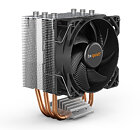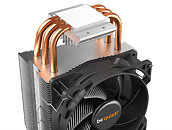Tuesday, March 9th 2021

be quiet! Announces Pure Rock Slim 2 CPU Cooler and MC1 Series M.2 SSD Heatsinks
be quiet!, market leader for PC power supplies in Germany since 2007, is expanding its portfolio with the revised Pure Rock Slim 2 CPU cooler and the MC1 and MC1 Pro SSD coolers suitable for M.2 2280 modules. With its reliable and quiet 92-millimeter Pure Wings 2 PWM fan and three 6 mm heat pipes, the Pure Rock Slim 2 can reliably dissipate waste heat of up to 130 W TDP. Thanks to its small dimensions the cooler is especially suitable for cases with limited space, while compatibility with AMD sockets has been improved over its predecessor. The new MC1 and MC1 Pro M.2 coolers reliably prevent modern SSDs from throttling due to excessive temperatures. Both models are equally suitable for single- or double-sided modules and feature an elegant black design that perfectly fits into any hardware layout.
The new be quiet! Pure Rock Slim 2 is a processor cooler with compact dimensions that dissipates waste heat of up to 130 watts thanks to its sophisticated design. With its optimized mounting system, the compact tower cooler's installation is child's play, even in tight spaces, and makes airflow-aligned installation on AMD sockets even easier. The single-tower cooler features a single Pure Wings 2 92 mm PWM fan. Thanks to its airflow-optimized fan blades this ensures that the cooler does not get louder than 25.4 dB(A) during operation.To ensure that the heat reaches the aluminium fins of the Pure Rock Slim 2 from the processor as quickly and efficiently as possible, be quiet! uses three direct-touch heat pipes with a diameter of 6 millimeters each. Due to the cooler's compact design, the installation of RAM modules with protruding heatsinks is possible without any problems. A top cover made of brushed aluminium and the aluminium caps attached to the ends of the heat pipes ensure a high-quality appearance. be quiet! offers a 3-year warranty on the Pure Rock Slim 2.
MC1 and MC1 Pro: Keeping hot SSDs cool
Modern M.2 SSDs offer speeds that are clearly superior to a conventional hard drive. However, the storage modules sometimes get very hot during operation and will significantly throttle their speed when they reach a certain temperature. This is precisely where the new M.2 coolers MC1 and MC1 Pro from be quiet! come in. The heatsinks absorb the waste heat from the SSD and release it into its surroundings. Equipped in this way, the drive can maintain its maximum speed even under prolonged load. The new be quiet! SSD coolers are suitable for 2280 modules that are equipped with single- or double-sided memory chips. Both models are classic passive coolers, although the MC1 Pro also has an integrated heat pipe for even better heat dissipation. The MC1 and MC1 Pro M.2 coolers come with a 3-year warranty from be quiet!
The be quiet! Pure Rock Slim 2 will be available from March 23 for €25.90 / $25.90 / £23.99. The M.2 coolers MC1 and MC1 Pro will hit the stores in April at €12.90 / $12.90 / £11.99 and €16.90 / $16.90 / £14.99 respectively.
The new be quiet! Pure Rock Slim 2 is a processor cooler with compact dimensions that dissipates waste heat of up to 130 watts thanks to its sophisticated design. With its optimized mounting system, the compact tower cooler's installation is child's play, even in tight spaces, and makes airflow-aligned installation on AMD sockets even easier. The single-tower cooler features a single Pure Wings 2 92 mm PWM fan. Thanks to its airflow-optimized fan blades this ensures that the cooler does not get louder than 25.4 dB(A) during operation.To ensure that the heat reaches the aluminium fins of the Pure Rock Slim 2 from the processor as quickly and efficiently as possible, be quiet! uses three direct-touch heat pipes with a diameter of 6 millimeters each. Due to the cooler's compact design, the installation of RAM modules with protruding heatsinks is possible without any problems. A top cover made of brushed aluminium and the aluminium caps attached to the ends of the heat pipes ensure a high-quality appearance. be quiet! offers a 3-year warranty on the Pure Rock Slim 2.
MC1 and MC1 Pro: Keeping hot SSDs cool
Modern M.2 SSDs offer speeds that are clearly superior to a conventional hard drive. However, the storage modules sometimes get very hot during operation and will significantly throttle their speed when they reach a certain temperature. This is precisely where the new M.2 coolers MC1 and MC1 Pro from be quiet! come in. The heatsinks absorb the waste heat from the SSD and release it into its surroundings. Equipped in this way, the drive can maintain its maximum speed even under prolonged load. The new be quiet! SSD coolers are suitable for 2280 modules that are equipped with single- or double-sided memory chips. Both models are classic passive coolers, although the MC1 Pro also has an integrated heat pipe for even better heat dissipation. The MC1 and MC1 Pro M.2 coolers come with a 3-year warranty from be quiet!
The be quiet! Pure Rock Slim 2 will be available from March 23 for €25.90 / $25.90 / £23.99. The M.2 coolers MC1 and MC1 Pro will hit the stores in April at €12.90 / $12.90 / £11.99 and €16.90 / $16.90 / £14.99 respectively.





40 Comments on be quiet! Announces Pure Rock Slim 2 CPU Cooler and MC1 Series M.2 SSD Heatsinks
As for there being cheaper alternatives: sure, obviously. This will also likely sell for less than MSRP over time. Its likely that this will be among the better coolers in this price bracket though, given its design, fan quality and the company behind it. That obviously doesn't mean there aren't good alternatives, but that's a good thing, no? More choice = more betterer?
TBH I have no idea how Zen3 handles AVX2. It's not a realistic workload for consumers.
All core OC? cold
stock settings? warm
PBO on? it's gunna run hot
PBO on boosts those temps quite a lot, i get 5050Mhz at quite a heat cost
something like the FX chips that had TJmax at 70C, 60C is redlining it
If you want more sources, just google "amd responds to ryzen 5000 temperature" and you'll get a whole page of different articles citing this source and others.
one key difference with the 5800x is that it has no stock cooler, so there is no real baseline other than <90C
1: whether it draws a lot of power, necessitating hefty cooling, as with recent Intel CPUs, and
2: whether it is difficult to keep cool compared to other CPUs consuming a similar amount of power.
The latter meaning is typically the one discussed when disucssing 7nm Ryzen, with this being due to thermal density as well as the off-centre hotspots created by the chiplet layout. (Of course the ability for the "105W" chips to consume up to 144W also matters.) But regardless of that, you can't discuss this without including the cooler, as the cooler is fundamental to any such discussion even where there isn't a commonly agreed-upon baseline, as the statement is fundamentally comparative, necessitating inclusion of the conditions being compared. If I was hitting 65°C with a large AIO or beefy tower cooler I would agree that that qualifies as running hot. But with those temps on a relatively low-end 212 Evo? Not even close. It does seem like I might have a better than average chip going off what I've seen around the internet, but it's still a cool-running chip. Heck, my 1600X doesn't stay much below these temperatures on water cooling.
As for increasing TjMax and letting the chips boost higher - aren't CPUs with TjMax <100°C quite rare in the grand scheme of things? Don't most laptops bounce off their ~100°C throttle points constantly under load? I know Ryzen chips have had low throttle points, but increasing TjMax actually means the chip runs cooler relative to its capabilities after all. It might run hotter in absolute numbers, but those don't matter whatsoever - it's what the chip can safely handle that matters. So if one CPU has a TjMax of 75°C and one has 95°C, the former runs at 65°C and the latter at 80°C, the latter still has more thermal headroom and is running further from its limits, despite the higher absolute temperature. Of course if both are bouncing off the thermal throttle point, then they're running equally close to their throttle points, making them equal. One number might be more comfortable to look at than the other, but the difference for the chips is zero.
After all, we got into this due to people saying the cooler this thread is actually about is of less value due to Zen 3 being difficult to cool. In other words, the question is how difficult it is to keep cool with a given cooler. I would have no problem running a 65W current-gen Ryzen under a cooler like this, that's for sure.